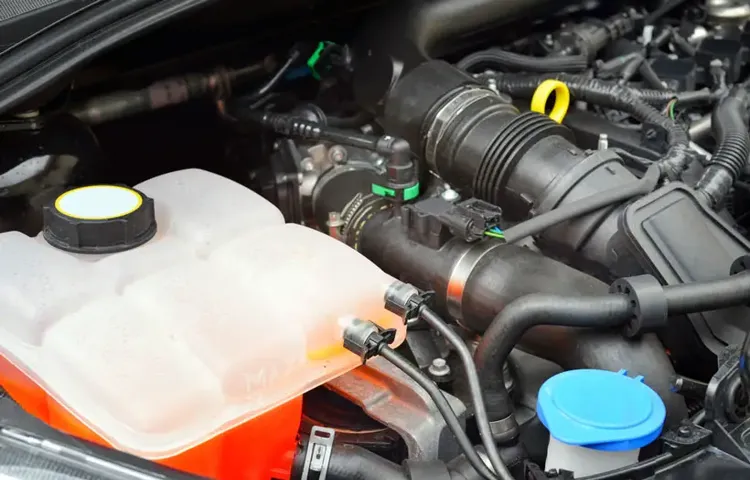Have you ever wondered why mechanics recommend changing your engine coolant periodically? It’s easy to overlook this maintenance task, but it’s actually crucial for the health and longevity of your vehicle. Your engine coolant, also known as antifreeze, plays a vital role in keeping your engine from overheating and preventing corrosion. Over time, the coolant can become contaminated with debris and lose its effectiveness, putting your engine at risk and potentially causing costly damage.
Think of it like changing the oil in your car; it may not seem urgent, but neglecting it can have serious consequences. Keep reading to learn more about the importance of changing your engine coolant and how often you should do it.
Table of Contents
What is Engine Coolant?
Engine coolant is an essential fluid for a vehicle’s engine. It helps regulate the temperature of the engine so that it doesn’t overheat or freeze up. Over time, engine coolant can become contaminated with rust, debris, and other pollutants, which can reduce its effectiveness.
That is why engine coolant should be changed periodically. Not only does this help maintain the engine’s temperature control, but it can also prevent corrosion in the engine’s components. Regular maintenance and changing of the engine coolant can increase the lifespan of the vehicle and help avoid costly repairs down the line.
So, make sure to check your vehicle’s owner manual for recommended coolant change intervals and schedule maintenance with a trusted mechanic or dealership. Remember to change the coolant in a timely manner, it’s a small yet essential step to keep your vehicle in good shape and running smoothly.
Definition and Importance
Engine coolant, also known as antifreeze, is a liquid substance that is essential to maintaining the proper functioning of a vehicle engine. It works by circulating through the engine and absorbing the heat that is generated as the engine runs. The hot coolant is then transported to the radiator, where it is cooled down, and the process repeats.
Coolant is typically a blend of water and chemicals, including ethylene glycol, propylene glycol, or glycerol, which help to prevent the coolant from freezing in cold temperatures and boiling in hot temperatures. Using the right type and amount of coolant is crucial to keep your engine functioning properly. Without coolant, the engine can overheat and cause critical internal damage.
Over time, coolant can become contaminated with debris and lose its effectiveness, which is why it is essential to replace it according to the manufacturer’s recommendation. Regular engine maintenance, including checking the coolant level and quality, is a simple yet effective way to extend your engine’s lifespan and avoid costly repairs. So next time you take your vehicle for a tune-up, make sure the mechanic pays attention to your coolant!

Types of Coolant
Engine Coolant Engine coolant, also known as antifreeze, is a liquid substance that helps regulate the temperature of the engine in your vehicle. This mixture of water and antifreeze can be found in the radiator and is circulated throughout the engine to keep it running at a consistent temperature. Coolant is important because it prevents the engine from overheating, which can cause serious damage and expensive repairs.
There are different types of engine coolant, including ethylene glycol and propylene glycol, which can have different colors and additives depending on the manufacturer. It is important to check your vehicle’s manual or consult with a mechanic to determine which type of coolant is appropriate for your specific make and model. Proper maintenance and regular replacement of the coolant can help ensure the longevity and performance of your engine.
Why Changing Engine Coolant is Important?
As a car owner, it is essential to know that one of the vital components of your vehicle is the engine coolant. It plays a crucial role in regulating the engine’s temperature, preventing it from overheating. However, over time, as the coolant circulates, it collects debris and other contaminants, which can reduce its effectiveness.
This is why changing engine coolant periodically is crucial. It ensures that the coolant is free from any contaminants that could hinder its performance. Moreover, old coolant can become acidic, which can lead to corrosion of the engine parts.
It can also cause the radiator to rust, which can ultimately result in leaks. Therefore, it is always wise and necessary to change the coolant timely to avoid such serious engine damages and costly repairs. By doing so, you can rest assured that your engine will run smoothly, and your car will last longer.
Avoiding Engine Corrosion
Changing engine coolant is one of the most important maintenance tasks you can do to prevent engine corrosion. If coolant is left unchanged for too long, it can create acidic conditions that lead to rust and corrosion, which can eventually cause leaks, overheating, and engine failure. That’s why it’s recommended to change engine coolant every two to three years, depending on the manufacturer’s guidelines.
Not only does a fresh coolant help prevent corrosion, but it also helps regulate engine temperature and lubricate key components. It’s like changing the oil in your car – essential to keep everything running smoothly. So, if you want to avoid costly repairs and keep your engine running like new, don’t forget to change your coolant on time!
Preventing Engine Overheating
Changing engine coolant is crucial for preventing engine overheating and avoiding costly repairs. Coolant, also known as antifreeze, is responsible for regulating the engine’s temperature by dissipating heat. Over time, coolant breaks down and loses its ability to protect against corrosion and rust, as well as maintain proper pH levels.
This can lead to clogs in the radiator and heater core, which restrict the flow of coolant and cause the engine to overheat. Regularly changing the coolant at manufacturer-recommended intervals can prevent these issues and keep your car running smoothly. Think of it like changing the oil in your car; just as old oil can’t properly lubricate the engine, old coolant can’t properly regulate its temperature.
Don’t neglect this important maintenance task and risk damaging your engine – schedule a coolant change today.
Maintaining Optimal Engine Performance
Engine coolant plays a vital role in maintaining optimal engine performance, and that’s why changing it regularly is essential. Over time, coolant degrades and loses its ability to protect your engine from the damaging effects of overheating, rust, and corrosion. When it comes to engine maintenance, coolant is one of the essential fluids in your car that probably requires replacement every two to three years or after reaching a certain number of miles.
When you don’t change your engine coolant, its pH level will become more acidic, which can corrode the internal parts of your engine and cause severe damage. Moreover, old coolant can also clog the cooling system, resulting in the engine overheating, which can lead to engine failure and costly repairs. Therefore, always remember that changing your engine coolant is not just an essential aspect of car maintenance, but it also ensures that your car stays in excellent condition, extends its lifespan, and saves you from expensive repairs down the road.
When to Change Engine Coolant?
Engine coolant, also known as antifreeze, is a vital component of any vehicle’s cooling system. It helps regulate the temperature of your engine and prevents it from overheating. Over time, however, engine coolant can lose its effectiveness, becoming contaminated with minerals and debris that can render it less efficient.
As such, it’s important to change your engine coolant periodically, usually every 30,000 to 50,000 miles, depending on your vehicle manufacturer’s recommendations. Failure to do so can lead to a range of issues, including corroded parts, reduced fuel economy, and ultimately, engine failure. So, make sure to keep your engine cool and functioning properly by changing your engine coolant on a regular basis.
Manufacturer Guidelines
As per the manufacturer guidelines, one should change their engine coolant every 30,000 to 50,000 miles. However, you should still keep an eye on the condition of your engine coolant. If the coolant appears cloudy or has a rusty color, or if you have to add more coolant frequently, it’s probably time for a coolant change.
Engine coolant is a crucial component of your vehicle’s engine, as it helps regulate the temperature and maintain the engine’s performance. Over time, the coolant deteriorates and loses its effectiveness. Changing your engine coolant on schedule can help extend the life of your engine and prevent serious damage.
In addition to this, keep in mind that using the right type of coolant is equally important. Different vehicles need different types of coolant, so double-check your vehicle’s owner’s manual to ensure you are using the correct one. By regularly changing your engine coolant and using the right type of coolant, you can help keep your car running smoothly.
Signs Your Coolant Needs Changing
Coolant changing, engine coolant There are various signs to look out for to know when your engine coolant needs changing. Firstly, the color of the coolant can indicate its state and age. If the liquid is murky or rusty, then it’s time for a coolant change.
Another sign of a coolant that needs changing is a sweet-smelling odor from the engine, indicating that the coolant is leaking out or past its lifespan. Furthermore, if the engine temperature gauge increases, it could mean that the coolant is insufficient or not functioning correctly. In such cases, your car requires an immediate coolant refill.
Lastly, the mileage of your vehicle is also a clear indication of when you need to change your engine coolant. For instance, if you haven’t changed the coolant in 30,000 to 60,000 miles or constant driving time of a year, then it’s best to change it. Keeping tabs on the above signs can help increase the longevity of your engine, enhance performance and save you money on costly repairs down the line.
Conclusion
Like any other component in your vehicle, your engine coolant simply can’t last forever. Over time, it becomes contaminated with debris and dirt, loses its protective properties and can even become acidic, causing damage to your engine’s metal components. But, fear not, changing your engine coolant periodically can help keep your car running smoothly, prevent corrosion, improve engine performance, and ultimately save you from costly repairs in the long run.
So, don’t wait until it’s too late – give your engine the TLC it deserves and change your coolant regularly!”
FAQs
What is engine coolant and why is it important for a vehicle?
Engine coolant is a liquid that helps regulate the temperature of a vehicle’s engine. It is important because it prevents the engine from overheating and potential damage.
How often should engine coolant be changed?
Engine coolant should be changed periodically, according to the manufacturer’s recommended schedule. This is typically every 2 to 5 years.
What happens if engine coolant is not changed regularly?
If engine coolant is not changed regularly, it can become contaminated and less effective at regulating engine temperature. This can lead to overheating and damage to the engine.
Can I use any type of engine coolant in my vehicle?
No, it is important to use the type of engine coolant recommended by the vehicle manufacturer. Using the wrong type of coolant can cause damage to the engine.
How do I check the level of engine coolant in my vehicle?
The level of engine coolant can be checked by locating the coolant reservoir under the hood and checking the “full” or “fill” line on the side of the container.
What are the signs that my engine coolant needs to be changed?
Signs that engine coolant needs to be changed include a drop in engine performance, overheating, and a sweet or unusual odor coming from the engine.
Can I change my engine coolant myself or should I take it to a mechanic?
Changing engine coolant can be done by a knowledgeable car owner, but if you are unsure about the process, it is best to take the vehicle to a trusted mechanic.



